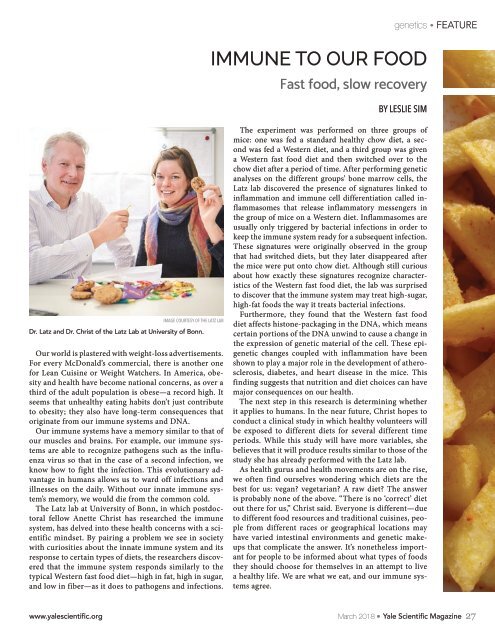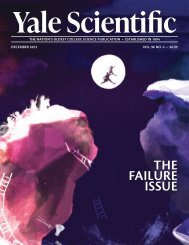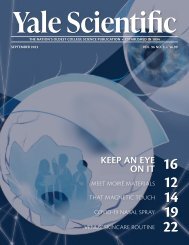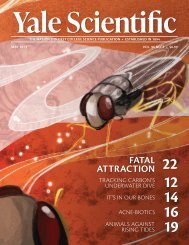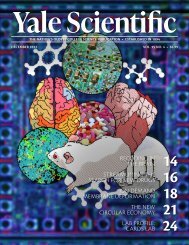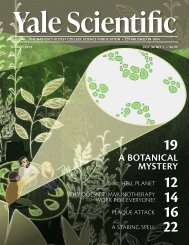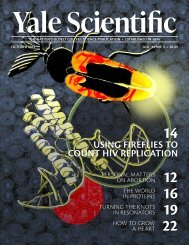YSM Issue 91.1
Create successful ePaper yourself
Turn your PDF publications into a flip-book with our unique Google optimized e-Paper software.
genetics<br />
FEATURE<br />
IMMUNE TO OUR FOOD<br />
Fast food, slow recovery<br />
BY LESLIE SIM<br />
IMAGE COURTESY OF THE LATZ LAB<br />
Dr. Latz and Dr. Christ of the Latz Lab at University of Bonn.<br />
Our world is plastered with weight-loss advertisements.<br />
For every McDonald’s commercial, there is another one<br />
for Lean Cuisine or Weight Watchers. In America, obesity<br />
and health have become national concerns, as over a<br />
third of the adult population is obese—a record high. It<br />
seems that unhealthy eating habits don’t just contribute<br />
to obesity; they also have long-term consequences that<br />
originate from our immune systems and DNA.<br />
Our immune systems have a memory similar to that of<br />
our muscles and brains. For example, our immune systems<br />
are able to recognize pathogens such as the influenza<br />
virus so that in the case of a second infection, we<br />
know how to fight the infection. This evolutionary advantage<br />
in humans allows us to ward off infections and<br />
illnesses on the daily. Without our innate immune system’s<br />
memory, we would die from the common cold.<br />
The Latz lab at University of Bonn, in which postdoctoral<br />
fellow Anette Christ has researched the immune<br />
system, has delved into these health concerns with a scientific<br />
mindset. By pairing a problem we see in society<br />
with curiosities about the innate immune system and its<br />
response to certain types of diets, the researchers discovered<br />
that the immune system responds similarly to the<br />
typical Western fast food diet—high in fat, high in sugar,<br />
and low in fiber—as it does to pathogens and infections.<br />
The experiment was performed on three groups of<br />
mice: one was fed a standard healthy chow diet, a second<br />
was fed a Western diet, and a third group was given<br />
a Western fast food diet and then switched over to the<br />
chow diet after a period of time. After performing genetic<br />
analyses on the different groups’ bone marrow cells, the<br />
Latz lab discovered the presence of signatures linked to<br />
inflammation and immune cell differentiation called inflammasomes<br />
that release inflammatory messengers in<br />
the group of mice on a Western diet. Inflammasomes are<br />
usually only triggered by bacterial infections in order to<br />
keep the immune system ready for a subsequent infection.<br />
These signatures were originally observed in the group<br />
that had switched diets, but they later disappeared after<br />
the mice were put onto chow diet. Although still curious<br />
about how exactly these signatures recognize characteristics<br />
of the Western fast food diet, the lab was surprised<br />
to discover that the immune system may treat high-sugar,<br />
high-fat foods the way it treats bacterial infections.<br />
Furthermore, they found that the Western fast food<br />
diet affects histone-packaging in the DNA, which means<br />
certain portions of the DNA unwind to cause a change in<br />
the expression of genetic material of the cell. These epigenetic<br />
changes coupled with inflammation have been<br />
shown to play a major role in the development of atherosclerosis,<br />
diabetes, and heart disease in the mice. This<br />
finding suggests that nutrition and diet choices can have<br />
major consequences on our health.<br />
The next step in this research is determining whether<br />
it applies to humans. In the near future, Christ hopes to<br />
conduct a clinical study in which healthy volunteers will<br />
be exposed to different diets for several different time<br />
periods. While this study will have more variables, she<br />
believes that it will produce results similar to those of the<br />
study she has already performed with the Latz lab.<br />
As health gurus and health movements are on the rise,<br />
we often find ourselves wondering which diets are the<br />
best for us: vegan? vegetarian? A raw diet? The answer<br />
is probably none of the above. “There is no ‘correct’ diet<br />
out there for us,” Christ said. Everyone is different—due<br />
to different food resources and traditional cuisines, people<br />
from different races or geographical locations may<br />
have varied intestinal environments and genetic makeups<br />
that complicate the answer. It’s nonetheless important<br />
for people to be informed about what types of foods<br />
they should choose for themselves in an attempt to live<br />
a healthy life. We are what we eat, and our immune systems<br />
agree.<br />
www.yalescientific.org<br />
March 2018<br />
Yale Scientific Magazine<br />
27


